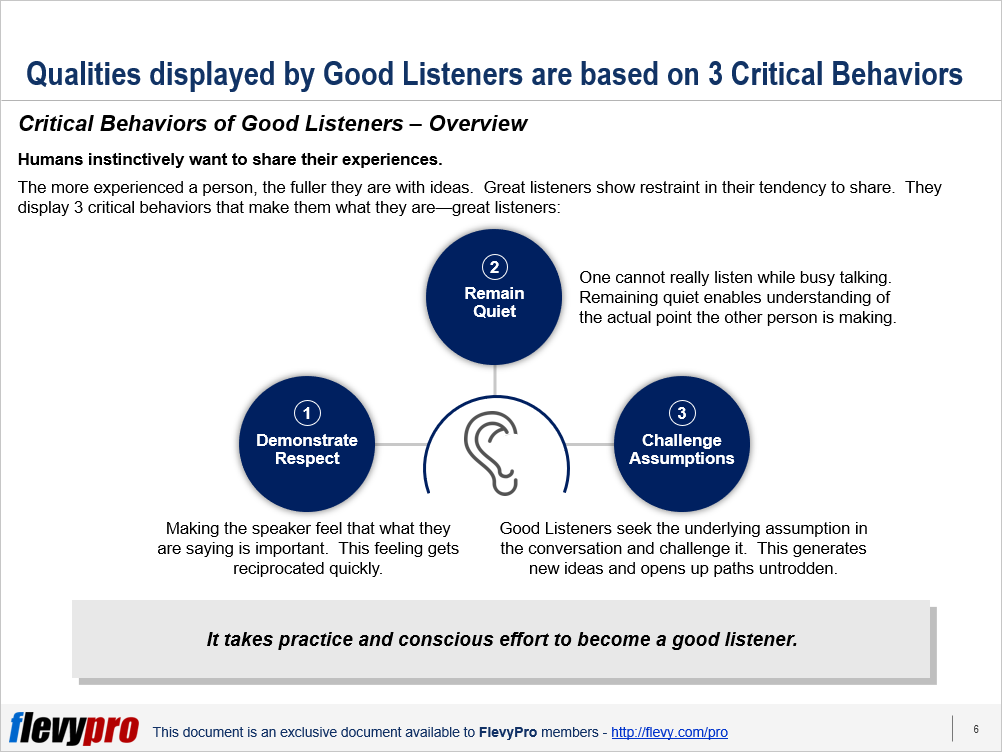Editor's Note: Take a look at our featured best practice, Soft Side of Change Management (20-slide PowerPoint presentation). This document contains 6 frame Change Management frameworks that deal with the "soft" side of managing effective organizational change:
1. Dimensions of Change
2. Emotional Cycle of Change
3. Ingredients of Change
4. Level of Commitment
5. Phases of Team Building
6. Trust [read more]
* * * *
 Humans instinctively want to share their experiences. The more experienced a person, the fuller they are with ideas.
Humans instinctively want to share their experiences. The more experienced a person, the fuller they are with ideas.
Many people view Listening Skills to be of lesser consequence than articulation and focus on learning how they can present their own views more effectively.
Good listening—the keen and orderly pursuit of probing and challenging the information collected from others to enhance its quality and quantity—is key to developing a knowledge-base that creates new insights and ideas.
Listening is unquestionably the most efficient route to making informed judgments, particularly judgments that leaders have to make. That is why the Soft Skill of Good Listening is considered a building block of Leadership Development.
Good listening can lead to a longer and fruitful relationship at work and elsewhere. Exceptional Client Management and Team Management, especially, and a host of other situations demand Good Listening skills. Respecting the speaker, even if there is disagreement and reacting in the moment without expectation is part and parcel of Good Listening Skills. The speaker should feel respected and understood after having a conversation with a Good Listener.
People possessing Good Listening ability assume a somewhat passive speaking role in the conversation yet actively participate in the conversation using body language and follow-up questions. They display 3 Critical Behaviors that make them what they are—Great Listeners:
Demonstrate Respect
Making the speaker feel that what they are saying is important. This feeling gets reciprocated quickly.
Remain Quiet
One cannot really listen while busy talking. Remaining quiet enables understanding of the actual point the other person is making.
Challenge Assumptions
Good Listeners seek the underlying assumption in the conversation and challenge it. This generates new ideas and opens up paths untrodden.

Let us look a little more deeply into some of the key characteristics of the 3 Critical Behaviors of Good Listeners.
Demonstrate Respect
People displaying a Problem Solving Mindset solicit input from all levels and demonstrate respect in this manner. They always make the speakers feel that they have something exclusive to contribute and assume that the conversation partner has the proficiency to develop worthy solutions.
Remain Quiet
In a good conversation, the conversation partner speaks 80% of the time and the Ideal Listener speaks 20% of the time. A Good Listener poses questions in most of the 20% time. By remaining quiet the listener’s objective is to extract the prime motivation or thought behind the conversation. Patience and practice are needed to cultivate the habit of weighing in at the correct moment.
Challenge Assumptions
A Good Listener challenges long-held and valued assumptions in order to make gains from conversations. Ambiguity is embraced and a quest to uncover what both conversation partners can gain from the conversation is enlivened.
From the above 3 Critical Behaviors, we can synthesize the following 13 actions that a Good Listener should make while in an active conversation:
- Be fully present.
- Do not listen to respond.
- React in the moment.
- Do not have an agenda.
- Do not jump to give advice.
- Never interrupt.
- Ask follow-up questions.
- Listen as much as (or more than) speaking.
- Demonstrate listening.
- Be patient.
- Listen to learn.
- Be interested in what the speaker is interested in.
- Summarize what has been heard.
Identifying what a Bad Listener looks like helps avoid such behavior and consequentially move us on the path to becoming a Good Listener. Bad listeners may be categorized into the following 6 types:
- The Opinionator
- The Grouch
- The Preambler
- The Perseverator
- The Answer Man
- The Pretender
The same person can display these behaviors at different times and under different circumstances. Perfecting listening skills means learning what prevents us from seeking and hearing the information we need.
Interested in learning more about the critical behaviors and actions of Good Listeners, and 6 Types of Bad Listeners? You can download an editable PowerPoint on Soft Skills: Good Listening here on the Flevy documents marketplace.
Do You Find Value in This Framework?
You can download in-depth presentations on this and hundreds of similar business frameworks from the FlevyPro Library. FlevyPro is trusted and utilized by 1000s of management consultants and corporate executives. Here’s what some have to say:
“My FlevyPro subscription provides me with the most popular frameworks and decks in demand in today’s market. They not only augment my existing consulting and coaching offerings and delivery, but also keep me abreast of the latest trends, inspire new products and service offerings for my practice, and educate me in a fraction of the time and money of other solutions. I strongly recommend FlevyPro to any consultant serious about success.”
– Bill Branson, Founder at Strategic Business Architects
“As a niche strategic consulting firm, Flevy and FlevyPro frameworks and documents are an on-going reference to help us structure our findings and recommendations to our clients as well as improve their clarity, strength, and visual power. For us, it is an invaluable resource to increase our impact and value.”
– David Coloma, Consulting Area Manager at Cynertia Consulting
“FlevyPro has been a brilliant resource for me, as an independent growth consultant, to access a vast knowledge bank of presentations to support my work with clients. In terms of RoI, the value I received from the very first presentation I downloaded paid for my subscription many times over! The quality of the decks available allows me to punch way above my weight – it’s like having the resources of a Big 4 consultancy at your fingertips at a microscopic fraction of the overhead.”
– Roderick Cameron, Founding Partner at SGFE Ltd

578-slide PowerPoint presentation
Curated by McKinsey-trained Executives
Unlock Your Leadership Potential with the Ultimate Executive Presence Toolkit: 500+ PowerPoint Slides and 100+ Pages of Templates Included
Are you ready to elevate your leadership skills, command respect in any room, and influence decisions at the
[read more]
Readers of This Article Are Interested in These Resources

22-slide PowerPoint presentation
Introducing "The Ultimate Work Life Balance Masterclass": Achieve Harmony and Success in Every Aspect of Your Life!
In today's fast-paced and demanding world, achieving a healthy work-life balance has become more crucial than ever. Are you feeling overwhelmed, constantly juggling multiple
[read more]

39-slide PowerPoint presentation
Atomic Habit to Change Your Life
Contents :
1. What is Atomic Habits ?
2. Why Are They Called Atomic Habits?
3. Pattern of Behavior
4. Focus on Habits or System
5. Habits Must be Daily Executed
6. 3 Key Tips of Building GOOD HABITS
7. Tips 1 : Make It Obvious
8. Habit Implementation
[read more]

21-slide PowerPoint presentation
A critical mistake in a Post-merger Integration (PMI) is to assume that logic and facts will prevail. Management often presume if we communicate the strategic rationale of the merger, most employees will support the merger.
In reality, PMI is dominated by the "soft" human emotions, as is the
[read more]

246-slide PowerPoint presentation
Unlock Your Leadership Potential with the Ultimate Self-Awareness and Self-Management Toolkit!
Are you ready to take your leadership skills to the next level? Introducing our comprehensive 210+ slides PowerPoint deck--the ultimate Self-Awareness and Self-Management Toolkit. Packed with
[read more]
 Humans instinctively want to share their experiences. The more experienced a person, the fuller they are with ideas.
Humans instinctively want to share their experiences. The more experienced a person, the fuller they are with ideas.




